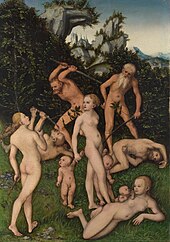Ages of Man
This articleneeds additional citations forverification.(January 2022) |

TheAges of Manare the historical stages of human existence according toGreek mythologyand its subsequentRoman interpretation.
BothHesiodandOvidoffered accounts of the successive ages of humanity, which tend to progress from an original, long-gone age in which humans enjoyed a nearly divine existence to the current age of the writer, in which humans are beset by innumerable pains and evils. In the two accounts that survive from Ancient Greece and Rome, this degradation of thehuman conditionover time is indicated symbolically with metals of successively decreasing value (but increasing hardness).
Hesiod's Five Ages
[edit]


TheGreekpoetHesiod(between 750 and 650 BC) outlined his Five Ages in his poemWorks and Days(lines 109–201). His list is:
- Golden Age– TheGolden Ageis the only age that falls within the rule ofCronus.Created by the immortals who live on Olympus, these humans were said to live among the gods and freely mingled with them. Peace and harmony prevailed during this age. Humans did not have to work to feed themselves, for the earth provided food in abundance. They lived to very old age but with a youthful appearance and eventually died peacefully. Their spirits live on as "guardians".PlatoinCratylus(397e) recounts the golden race of men who came first. He clarifies that Hesiod did not mean men literally made of gold, but good and noble. He describes these men asdaemonsupon the Earth. Since δαίμονες (daimones) is derived from δαήμονες (daēmones,meaning knowing or wise), they are beneficent, preventing ills, and guardians of mortals.
- Silver Age– TheSilver Ageand every age that follows fall within the rule ofCronus'ssuccessor and son,Zeus.Men in the Silver Age lived for one hundred years under the dominion of their mothers. They lived only a short time as grown adults, and spent that time in strife with one another. During this Age, men refused to worship the gods and Zeus destroyed them for theirimpiety.After death, humans of this age became "blessed spirits" of the underworld.
- Bronze Age– This age is also sometimes known as theCopper AgeorBrazen Age.Men of the Bronze Age were hardened and tough, as war was their purpose and passion.Zeuscreated these humans out of theash tree.Their armor was forged ofbronze,as were their homes and tools. The men of this Age were undone by their own violent ways and left no named spirits; instead, they dwell in the "dark house ofHades".This Age came to an end with the flood ofDeucalion.[citation needed]
- Heroic Age– TheHeroic Ageis the one age that does not correspond with any metal. It is also the only age that improves upon the age it follows. It was the heroes of this Age who fought atThebesandTroy.This race of humans died and went toElysium.
- Iron Age–Hesiodfinds himself in the Iron Age. During this age, humans live an existence of toil and misery. Children dishonor their parents, brother fights with brother, and the social contract between guest and host (xenia) is forgotten. During this age,might makes right,and bad men use lies to be thought good. At the height of this age, humans no longer feel shame or indignation at wrongdoing; babies will be born with gray hair and the gods will have completely forsaken humanity: "there will be no help against evil."
Ovid's Four Ages
[edit]TheRomanpoetOvid(1st century BC – 1st century AD) tells a similar myth of Four Ages in Book 1.89–150 of theMetamorphoses.His account is similar to Hesiod's, with the exception that he omits the Heroic Age. Ovid emphasizes that justice and peace defined theGolden Age.He adds that in this age, men did not yet know the art ofnavigationand therefore did not explore the larger world. Further, no man had knowledge of any arts but primitiveagriculture.In theSilver Age,Jupiterintroduces the seasons, and men consequently learn the art of agriculture and architecture. In theBronze Age,Ovidwrites, men were prone to warfare, but not impiety. Finally, in theIron Age,men demarcate nations with boundaries; they learn the arts of navigation and mining; they are warlike, greedy, and impious. Truth, modesty, and loyalty are nowhere to be found.
Related usage
[edit]These mythological ages are sometimes associated with historical timelines. In the chronology ofSaint Jerome,the Golden Age lasts c. 1710 to 1674 BC, the Silver Age 1674 to 1628 BC, the Bronze Age 1628 to 1472 BC, the Heroic Age 1460 to 1103 BC, while Hesiod's Iron Age was considered as still ongoing bySaint Jeromein the fourth century AD.[1]
Modern historicalperiodisationsuch as theThree-age systemhas reappropriated the termsBronze AgeandIron Ageto describe archaeological periods following theStone Agebased on predominant metallurgical practices. Congruently, the termGolden Ageis used to describe a civilization during a historical highpoint, for example theGolden Age of India,Islamic Golden Ageand theHanandTangdynasties ofChina.
See also
[edit]Similar concepts include:
- Christian:Six Ages of the World,Dispensationalism
- Hindu:Yuga Cycle(Satya,Treta,DvaparaandKali Yuga)
- Buddhist:Three Ages
- Jain:UtsarpiṇīandAvasarpiṇī
- Aztec:Five Suns
- Giambattista Vico's ricorso: the return of the society to a relatively more primitive condition
- JRR Tolkien's fictional "Four Ages"
- Oswald Spengler'sCivilizational model
- Modern archaeology:Three-age system(Stone, Bronze and Iron), with each of the stages further divided into substages (e.g. Stone Age comprisesPaleolithic,MesolithicandNeolithic).
- Lebenstreppe:an artistic tradition that depicts the ages as a series of ascending and descending steps
References
[edit]- ^St. Jerome."St. Jerome, Chronicle (2004-5). Preface of Jerome; Preface of Eusebius".Tertullian.org.Retrieved2012-11-16.
External links
[edit]- The Ages of Manat Greek Mythology Link
- "Five Ages of Man in Greek Mythology According to Hesiod"Archived2011-06-23 at theWayback Machineby N.S. Gill
- Hendrick Goltzius engravings of the Ages of Man from the De Verda collection "
- Ages of Manat GreekMythology.com
